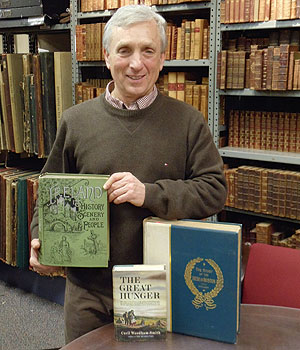
Irish books represent a particularly specialized area for collectors.
By Kenneth Gloss
As with any other area of collecting, books dealing with Irish history subdivide into numerous categories that offer a multitude of collecting specialties.
The Boston area is particularly rich in books about Irish history, because many immigrants wanted to preserve their pasts and the story of their birth country. Many of these books were printed in New York and Boston by people who had come to America.
A lot of the historical accounts had religious overtones to them because so much of the Irish culture was rooted in religion. There are books written about the history of the Irish in Ireland, the history of the Irish in Boston – virtually anyplace where there has been an Irish population. There are even collections of books on Irish history in Georgia and in Australia. During the 1700s, prison colonies were established in those places. People wrote accounts of their experiences and their ensuing lives that have now spawned collections. Many collectors look specifically for accounts of life in Ireland, from the Civil Wars in the 1700s, the British takeovers or the potato famine.
The earlier books are often hard to find because back then few people could afford books. Thus, few copies were printed. These books can now be worth thousands of dollars, depending on the subject matter and rarity. Even smaller events in Irish history have merited books and collections. There was an Irish convent in Charlestown in the 1840s that supposedly had abducted a woman and held her there. The people of Charlestown burned the place down in outrage. The book about that story can run up to $200.
The real migration of the Irish to America took place in the mid to late 1800s, during and after the potato famines. As Irish people became an integral part of Boston society, there were more accounts of famous Irish who had an impact on life here. Patrick O’Brien (one of the first Irish mayors), Cardinal Cushing and others are mentioned in historical tomes that attract collector attention. There is also a fair amount of historical accounts about the works of the Catholic Church, particularly the Jesuit Order. Stories about how the Catholics established churches, universities and schools abound, as do tales of missionaries who spread the Gospel throughout the country.
One person who has attracted a bit of collector attention is James Michael Curley, former mayor, governor and congressman for Boston. His autobiography, I’d Do It Again and his biography, The Purple Shamrock, can fetch between $50 and $100 dollars. There are a number of signed copies available for those looking for another bit of memorabilia. The fictional account of Curley’s life, The Last Hurrah, starring Spencer Tracey, served to increase interest in Curley when it was released. For peripheral collection items, Curley’s speeches and radio interviews make interesting additions. One speech in particular, delivered near the end of his career and entitled “How to Spend Campaign Funds” shows the true character and humor of the man. I have ten letters of Curley’s that I am keeping in my own personal collection. They were written to his wife while he was serving a term in the rat-infested Danbury prison (he was later pardoned). He wrote in one: “Most of the four-legged creatures here have more honor than the two-legged creatures in Washington.”
For fiction and literature lovers, there are a number of well-known Irish poets and writers whose works are the subject of collections. James Joyce’s book, Ulysses, is so famous that one could make a collection just out of the various copies of that one book. A first edition of Ulysses runs upwards of $50,000. Later editions can cost $2-10,000 while an American edition runs about $500-1000. There are so many copies of Joyce’s books, however, that it is possible to start your collection with very little money. I knew one professor of Irish literature who had close to 20,000 Joyce items in his collection.
A number of people cross over with their collections, whether they start out with a history or a literature focus. Some collectors have to be selective about what Joyce items they want, purely for financial reasons. However, people who want a general Irish collection have so many varieties of books from which to choose that they can find something at antique stores, yard sales and bookstores. There are large numbers of ephemeral materials, including posters, flyers and postcards that chronicle the history of the Irish in this area. Some of the materials are very derogatory, written in the days when anti-Irish sentiments were running high.
If you’re looking to collect Irish books, Boston is a great area to do so. I have two book dealers from Ireland who journey across the Atlantic to find books that aren’t available in Ireland. This helps them expand their collections and to see how the buying tastes of the American public differ from the native Irish. A collection of Irish books can start virtually anywhere. If you need help pinpointing your collection or finding the right books, just ask a book dealer. They enjoy the hunt for the right book as much as their customers.
Ken Gloss is the owner of the Brattle Book Shop in the Downtown Crossing section of Boston at 9 West Street. It’s America’s oldest antiquarian bookstore. Ken has been seen many times on PBS’ Antiques Roadshow. 2011 is the 62nd year of Gloss family ownership. For further information about book collecting and Ken’s next free and open talks please visit the Web site at: www.brattlebookshop.com or call 1-800-447-9595.















Reader Comments